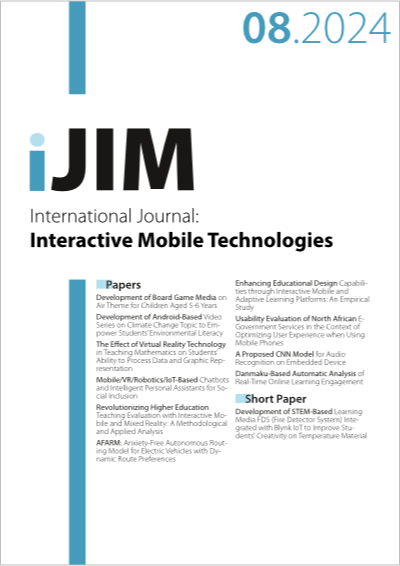Usability Evaluation of North African E-Government Services in the Context of Optimizing User Experience when Using Mobile Phones
DOI:
https://doi.org/10.3991/ijim.v18i08.46329Keywords:
Human computer interaction, Usability evaluation, Web design, E-Government, User satisfaction, Mobile phone.Abstract
E-governments are considered the primary gateway through which citizens can access services and benefit from the information provided by electronic platforms when needed. Although the situation in developed countries has shifted from electronic governments to local electronic services, many developing countries still encounter various challenges, such as ease of use and enhancing user experience. This study aims to help address the obstacles faced by North African countries, including Morocco and Tunisia, in the context of e-government usability. It evaluates the accessibility of these sites, addresses the issues involved in using them, and suggests solutions that could enhance user experience by improving ease of use. The limited previous research on this region makes this study even more relevant. Research-based web design and usability guidelines (RBWDUG), specifically the chapter on optimizing user experience, serve as the foundation of this research, facilitating the assessment of ease of use and user satisfaction. Converting this valuable tool into a questionnaire enabled the research to achieve valuable results through evaluation. The evaluation of ten websites in each country, with 100 participants involved in the assessment, reveals a common pitfall when it in improving user experience and ease of use. This issue impacts user satisfaction and the effectiveness of e-government services. An important relationship has been established between these usability issues and the effectiveness and efficiency of these services. The study emphasizes the vital connection between usability and e-government service efficiency while recommending improvements based on user feedback.
Downloads
Published
How to Cite
Issue
Section
License
Copyright (c) 2024 Mohamed Benaida

This work is licensed under a Creative Commons Attribution 4.0 International License.



